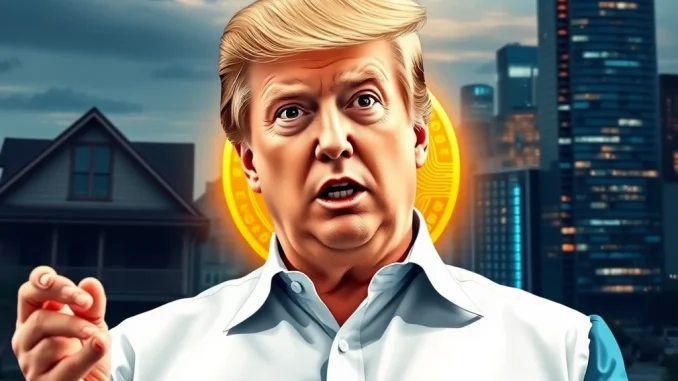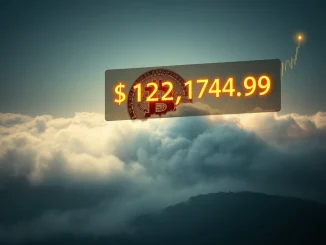
Is Bitcoin the new gold? The debate rages on, but a prominent voice has recently entered the fray, adding fuel to the fire. Eric Trump, son of former US President Donald Trump, has publicly declared Bitcoin as one of the “greatest store of values.” This statement, shared via Watcher Guru on X, highlights Bitcoin’s instant liquidity and its potential as a robust hedge against traditional assets like real estate. But what does this endorsement really mean, and why is the concept of Bitcoin as a store of value gaining traction? Let’s dive into the details.
Why Eric Trump Believes Bitcoin is a Top-Tier Store of Value
Eric Trump’s statement isn’t just a casual remark; it reflects a growing sentiment within certain financial and investment circles. He specifically points out two compelling attributes of Bitcoin:
- Instant Liquidity: Unlike traditional assets like real estate, which can take time and effort to convert into cash, Bitcoin can be bought and sold almost instantaneously on cryptocurrency exchanges worldwide. This 24/7, global market accessibility provides unparalleled liquidity.
- Hedge Against Real Estate: Real estate, while often considered a solid store of value, can be susceptible to market fluctuations, economic downturns, and even geographical risks. Bitcoin, being a decentralized digital asset, operates outside of traditional financial systems, potentially offering a hedge against these real-world vulnerabilities.
But is Eric Trump’s perspective just hype, or is there substance to the claim that Bitcoin is a legitimate and even superior store of value?
Understanding “Store of Value”: Is Bitcoin Really Worthy?
Before we delve deeper, let’s clarify what “store of value” truly means. In economics, a store of value is an asset that maintains its purchasing power over time. Historically, gold has been the quintessential store of value, prized for its scarcity, durability, and global recognition. Other assets often considered stores of value include:
- Precious Metals: Gold, silver, platinum – known for their finite supply and historical significance.
- Real Estate: Land and property – tangible assets that can appreciate in value over the long term.
- Certain Currencies: Historically, stable currencies like the Swiss Franc have been considered stores of value.
- Collectibles: Art, rare stamps, and other collectibles can also act as stores of value for niche markets.
Now, where does Bitcoin fit into this picture? For proponents, Bitcoin shares several characteristics with traditional stores of value, while also offering unique advantages:
Bitcoin as a Modern Store of Value: The Pros
- Decentralization and Scarcity: Unlike fiat currencies controlled by central banks, Bitcoin operates on a decentralized blockchain network, making it resistant to censorship and manipulation. Its supply is also capped at 21 million coins, creating artificial scarcity similar to gold. This scarcity is a cornerstone argument for Bitcoin’s long-term value proposition.
- Digital and Portable: In today’s digital age, Bitcoin’s digital nature is a significant advantage. It can be easily stored, transferred, and accessed globally via digital wallets, making it far more portable than physical gold or real estate.
- Accessibility and Divisibility: Investing in gold or real estate can require significant capital. Bitcoin, on the other hand, is highly divisible. You can own a fraction of a Bitcoin, making it accessible to investors with varying budgets. Furthermore, accessing Bitcoin markets is becoming increasingly easier through various exchanges and platforms.
- Transparency and Security (Blockchain): Bitcoin transactions are recorded on a public, transparent ledger – the blockchain. While pseudonymous, this transparency enhances security and auditability. The cryptographic security of the Bitcoin network is also a key factor in its perceived value.
The Volatility Question: Is Bitcoin Too Risky to be a Store of Value?
One of the biggest criticisms leveled against Bitcoin as a store of value is its notorious price volatility. Unlike gold, which tends to exhibit more stable price movements, Bitcoin’s price can fluctuate dramatically in short periods. This volatility raises legitimate concerns about its reliability as a long-term store of value.
However, proponents argue that:
- Early Adoption Phase: Bitcoin is still a relatively young asset class. Its volatility may decrease as the market matures, adoption increases, and regulatory frameworks become clearer.
- Volatility as Opportunity: Savvy investors can potentially capitalize on Bitcoin’s volatility through strategic trading and long-term holding strategies.
- Long-Term Perspective: When viewed over longer time horizons (e.g., several years), Bitcoin’s price trend has been consistently upward, despite short-term fluctuations. This long-term growth trajectory supports the store of value narrative for some investors.
Investment in Bitcoin: Actionable Insights for You
So, should you consider Bitcoin as an investment and a store of value? Here are some actionable insights:
- Do Your Own Research (DYOR): Before investing in any cryptocurrency, including Bitcoin, conduct thorough research. Understand the technology, the market dynamics, and the risks involved.
- Diversification is Key: Never put all your eggs in one basket. Bitcoin, even as a potential store of value, should be part of a diversified investment portfolio that includes other asset classes.
- Risk Management: Be prepared for volatility. Only invest what you can afford to lose. Consider dollar-cost averaging (DCA) to mitigate the impact of price swings.
- Long-Term Vision: If you believe in the long-term potential of Bitcoin as a store of value, consider a long-term holding strategy. Avoid emotional trading based on short-term market fluctuations.
- Stay Informed: The cryptocurrency space is constantly evolving. Stay updated on market trends, regulatory developments, and technological advancements.
The Bottom Line: Is Bitcoin the Future of Value Storage?
Eric Trump’s endorsement adds to the growing chorus of voices recognizing Bitcoin’s potential as a store of value. While volatility remains a valid concern, Bitcoin’s unique characteristics – decentralization, scarcity, portability, and accessibility – make a compelling case for its role in the modern financial landscape. Whether Bitcoin will ultimately dethrone gold or other traditional stores of value remains to be seen. However, its increasing adoption and recognition suggest that it’s a force to be reckoned with in the evolving world of finance and investment.



